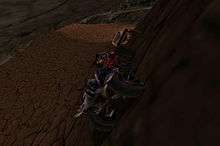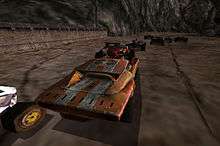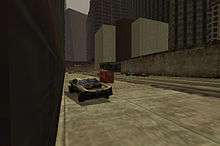Powerslide (video game)
| Powerslide (Game) | |
|---|---|
_cover.jpg) | |
| Developer(s) | Ratbag Games |
| Publisher(s) | GT Interactive |
| Platform(s) | Windows |
| Release date(s) | 1998 |
| Genre(s) | Racing, Futuristic |
| Mode(s) | Multiplayer, single-player |
Powerslide is a post-apocalyptic PC racing game developed by the now defunct Ratbag Games.[1] It was released in Australia, United States, Japan and Europe in 1998.[2][3] Ratbag, the Australia-based game company, was purchased by Midway Studios in 2005 and was shut down shortly after, leaving the staff unemployed. Powerslide was praised for its graphics and AI in particular, which were both impressive for their time. A sequel, Powerslide: Slipstream, was in development as of 2004, but Ratbag couldn't find a suitable publisher, and shortly after their company was shut down.[4] Powerslide can still however be purchased at GOG.com.[5]
Story

Powerslide is set in a dystopian future where the ozone layer has disintegrated, leading to worldwide poverty and a collapse of society. Society has rebuilt in two distinct factions - above and below ground. Below ground live the wealthy corporations, in a sterile and controlled environment, whilst above ground live feral communities.
The feral population have taken advantage of the abandoned roads and vehicles, joyriding through deserted streets and countryside, docklands, sewers, and multi-level parking lots. Known as "Powersliding" the races were originally held illegally by feral groups, however the underground corporations have now taken an interest in the sport as well.[6]
Gameplay

Powerslide is set in the near future and is a "drive anywhere" arcade racer. There are three main modes: single race, time trial, and championship. Single races can be played on any unlocked track, solo or in online multiplayer. Records can be set in this mode, and saved. Time trials involve only a lone player in a sort of practice run for any given track. Championships consist of consecutive sets of tracks, mainly the Novice, Advanced, and Expert championships. The Insane level can be attempted if the Expert championship is completed.
The game is set in a "drive-anywhere" atmosphere, there are no invisible walls or track side facades holding the player back, allowing the player to explore the tracks at will during races, etc. Cheat codes, which can simply be typed in during a race, can be discovered by reaching out-of-the-way places across the tracks. By beating championships, new cars and tracks are unlocked. The supercar can be earned by beating the Expert championship.[7]
Physics

Powerslide's physics engine has 4 wheel independent suspension. It also gives the cars full 6 degrees of freedom movement. The player is not stuck to a flat track. There are no canned crashes either. Powerslide boasts a complex physics model which realistically simulates powersliding over varying surface types and 4 wheel independent suspension movement over rugged terrains. The physics engine also allows driving over any in-game scenery such as mountains, walls and hidden areas.
Powerslide's force feedback is generated from information supplied directly from the physics engine. Slide and deflection forces acting upon the front wheels are transmitted directly to the force feedback device. Thus as you slide from sand onto bitumen you will feel the wheels bite into the tarmac and as you hit a gutter you will feel the wheel or joystick jump in a realistic manner. Forces are also generated from collisions with other cars or awkward landings from jumps. All of these forces are generated in response to the particular conditions the driver is experiencing at the time. As a result, force feedback adds valuable information to the driving experience and makes it easier to feel what the vehicle is doing. This is in contrast to most other racing game force feedback where a series of canned force feedback events are triggered by different terrains or generic game events. Such force feedback adds nothing to the feel of the vehicle and can actually get in the way of good lap times.[8]
Graphics

The visuals were advanced for 1998, allowing 300,000 polygons on-screen at once.[9] They were highly praised by the media, with IGN in particular calling them "beautiful" and "fully rendered".[10]
Sound

The SFX had the ability to morph into their surroundings by becoming echo-like when in enclosed spaces, making a more immersive experience. Even if you can't see cars behind you, you can sense where they are, how far away they are and how fast they are travelling based upon the audio cues alone. The music in Powerslide is mostly a mixture of techno and rock.[11]
Multiplayer

Powerslide supports up to 12 players via online modes. Two game modes are included in multiplayer: single race, and fox and hounds. Fox and Hounds is the game where one person is chased by the rest of the players. It gives you a chance to use the drive-anywhere tracks to the best advantage – find places to hide, cut other players off at the pass, team up against the fox. The player who catches the fox in turn becomes the fox. The aim is to be the first player to accumulate 4 minutes as the fox. The single races are like in the single player mode.[12]
Reception
The game received positive reviews from the press, generating a 75% ranking at GameRankings.[13] It was praised for its impressive graphics, multiplayer, and sound. The real-world experience AI was also credited. However, the number of copies in the United States was limited because of budget problems.
Powerslide: Slipstream
A follow-up, Powerslide: Slipstream, as of 2004, was in development by the same company responsible for the original Powerslide. It was to feature enhanced graphics, more of the impressive AI, and online support. It was being developed for PS2 and PC, and possibly Xbox. However, Ratbag never found a suitable publisher for this game, and the entire company's cancellation was soon to follow.
References
- ↑ "Powerslide - PC - IGN". Pc.ign.com. 1998-12-22. Retrieved 2012-11-30.
- ↑ http://www.mobygames.com/game/windows/powerslide/release-info
- ↑ http://www.ign.com/cheats/games/powerslide-pc-3124
- ↑ "Powerslide: Slipstream - PlayStation 2 - IGN". Ps2.ign.com. 2003-05-31. Retrieved 2012-11-30.
- ↑ http://www.gog.com/
- ↑ http://www.carmageddon.com/forum/topic/26314
- ↑ http://dima241.narod.ru/ps_manual.htm
- ↑ http://dima241.narod.ru/ps_manual.htm
- ↑ "Powerslide - IGN". Pc.ign.com. Retrieved 2012-11-30.
- ↑ "Powerslide - IGN". Pc.ign.com. Retrieved 2012-11-30.
- ↑ http://dima241.narod.ru/ps_manual.htm
- ↑ http://dima241.narod.ru/ps_manual.htm
- ↑ "Powerslide for PC". GameRankings. 1998-11-30. Retrieved 2012-11-30.